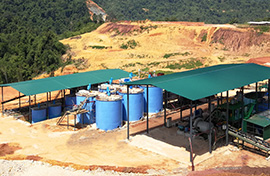-
 E-mail
guhaixin0724@gmail.com
E-mail
guhaixin0724@gmail.com
-
 Call Us
008613683147042
Call Us
008613683147042
 E-mail
guhaixin0724@gmail.com
E-mail
guhaixin0724@gmail.com
 Call Us
008613683147042
Call Us
008613683147042
2020-03-05 Views: 3158
Warm Tip: If you want to know more information, like quotation, products, solutions, etc., please Click here ,and contact us online.

Flotation agents are chemical agents used in the mineral flotation process which can adjust the surface properties of the minerals, increase or decrease the floatability of the minerals, and make the pulp properties and foam stability more conducive to mineral separation. Common flotation agents are collectors, foaming agents, inhibitors, activators, dispersants, flocculants and defoamers. This article mainly introduces flotation defoamer.
Flotation defoamer is a kind of defoaming agent, which is mainly refined by mineral oil, silicon and other special processes to solve the problem of defoaming in beneficiation. Flotation defoamer can be divided into oil type, solution type, emulsion type, powder type and compound type from the properties. Commonly, there are ether, sodium tripolyphosphate and fatty alcohol. In general, to solve the defoaming problem, defoamer will be added in the flotation of gold ore, lead-zinc ore, iron ore, phosphate ore, tungsten ore, fluorite ore and other minerals.
However, with the development of science and technology, some new defoamers have been developed for flotation process, such as KDZ-0753, KDZ-8850, KDZ-7623A.
Mainly based on the different surface chemical and physical properties of mineral particles, flotation achieves mineral separation by means of foam buoyancy. However, during flotation process, due to too much sludge, too high pH value of the pulp and too high flotation concentration, it usually results in a lot of foam produced. If we don’t handle in time, it will affect the operation progress, production cost and quality to varying degrees. For example, in gold ore flotation, when the fine particles of gold ore do not meet the standards, and the amount of foaming agent is added too large, it will makes the pH value of the pulp and the concentration of the pulp increase, and a large amount of foam to be generated, finally resulting in poor flotation results and large tail loss. So defoamer needs to be added in the flotation to prevent excessive foaming.
There is an interface at the intersection of each bubble in the foam, and the liquid at the interface tends to flow. When the liquid film gradually becomes thinner to a certain degree, the surface tension decreases and the foam will burst. When the defoamer is added in the pulp, the defoamer will enter the liquid film by its lower surface tension. Then, through spreading on the surface of the solution, it will take away a layer of solution near the surface, finally making the liquid film locally thin and the foam burst.
Strong defoaming capability and high efficiency;
Low surface tension;
Good balance with the surface;
Good heat resistance;
Good diffusivity and permeability;
Strong chemical stability and oxidation resistance;
Lower solubility in foaming solution.
The flotation defoamer can be directly added to the beneficiation operation. The recommended amount is 0.1% -0.8% of the foaming system. As long as the amount of defoamer is one millionth of the total amount of foaming medium, the defoaming effect can be produced. But the actual amount can only be determined according to the test. Defoamer can also be used after mixing with other powder additives.
Flotation defoamers are mostly packaged in 50kg, 120kg, 200kg plastic drums.
Flotation defoamer is not dangerous, non-toxic and non-flammable. It need to be sealed and stored in a cool, ventilated and dry place. Before the potion is used up, the container should be tightly sealed after each use. The shelf life of the agent under 25 ℃ is 12.
Properly sealed before transportation; we should do a good job of protection from moisture, strong acid and alkali rain, and other impurities.
The selection of flotation defoamer should be targeted. Before using the defoaming agent, we must understand the use environment, temperature, pH value and foaming medium.
Polyether defoamer can be used for small pulp concentration or thick pulp. Because the main components of polyether defoamer are block polymers of polyoxyethylene and polyoxyethylene in the presence of initiator. This substance has poor hydrophilicity and little dissolution in bubble medium.
The pulp with a large PH value and a high temperature can choose a high-carbon alcohol defoamer. The advantages are that it can quickly penetrate into the liquid and spread quickly, then eliminate the foam caused by a variety of surfactants. It can also stable defoaming under the strong alkali and high temperature.
Polysiloxane defoamer can be used for low pulp concentration and complicated foaming medium. Because polysiloxane defoamer can maintain a good defoaming effect at a lower concentration, and has outstanding foam suppressing performance. It can be used in the conditions of high temperature and strong alkali. With an excellent performance, it can easy dispersion in water and good compatibility with foaming media.
Silicone defoamer can be used for low pulp concentration and high temperature. Because it has the advantage of low solubility and can resist both high temperature and low temperature. Its chemical properties are inert, physical properties are stable. And there is no biological activity.
In short, the defoamer is a very important flotation agent, and different types of defoamers have different characteristics. All mine owners should consult a professional flotation agent manufacturer according to their own beneficiation plant, and develop a scientific and reasonable defoamer system through flotation agent experiments.
No. 188, Xinhai Street, high-tech Industrial Park, Fushan District, Yantai, Shandong, China.

Please leave your message here! We will send detail technical info and quotation to you!